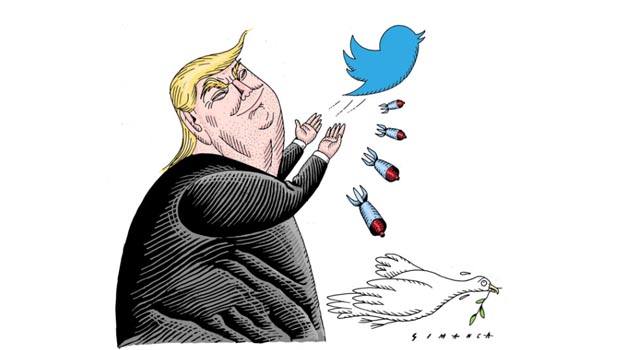Trump’s no appetite for war

We cannot rebut US President Donald Trump and his administration’s credit for the ingenuity in their efforts towards engaging North Korea and its leader Kim Jong-un. The challenge now for the Trump administration is translating this renewed contact into a process that leads to some degree of denuclearisation that would be difficult to reverse.
It needs no emphasizing that only peace can lay the foundation for a relationship between two historic enemies to address difficult matters and achieve their goals. It is indeed a requirement for normalization of relations and denuclearization. We believe peace and real diplomacy are the factors that can unbar big successes when it comes to nuclear weapons and human rights. As decades of isolation, sanctions and threats have not worked, Koreans now desperately need a new path and in this regard the US Congress can help by passing H Res 152, which calls for a formal end to this war that was supposed to be resolved more 70 years ago.
North Korea’s nuclear armament has left US with several possible options, all of which pose considerable drawbacks though. One is certainly coercion. If Trump rebuffs to accept North Korea as a state with nuclear weapons, the only way to fully denuclearize it is by force. Another option is accepting North Korea as a nuclear weapons state. Despite its obvious discomfort, the US has tolerated the nuclear weapons of China, India, Pakistan and India. However, none of these countries have used their nuclear weapons to pursue offensive strategies or nuclear imperialism. It is likely North Korea would also retain its weapons for defense rather than offence.
As long as Trump does not want to live with a nuclear North Korea, he must devise necessary initiatives to trade with Pyongyang. Perhaps there are two possible trades or deals: a weapon-for-weapon swap, in which the US gives up regional strategic assets such as US air wings, or units of command, at airbases in South Korea, in exchange for North Korean missiles or warheads or both. Or the US could effectively buy Pyongyang’s missiles and warheads in an arrangement akin to the 2015 Iran nuclear deal, whereby the US gives North Korea sanctions relief, huge financial incentives and development aid. However, despite Washington and Pyongyang starting the peace talks last year, the denuclearization process has not proceeded as expected. It is therefore necessary to continue the talks, instead of imposing more sanctions on the DPRK, because the DPRK is genuinely working to get the United Nations sanctions lifted. For instance, even when the situation on the peninsula became volatile after the failed Hanoi summit in February and there were increasing calls to impose stricter sanctions on the DPRK, it exercised restraint and created room for the resumption of the talks.
There are several aspects that have created the ground for the much hyped denuclearization of North Korea. The first one is the DPRK economy. As Kim has prioritized economic development over the nuclear program, and reformed the country's agricultural and industrial systems while emphasizing more focus on the role of the market, North Korea can now better cope with external economic pressures. There is no denying that sanctions have helped bring Pyongyang back to the negotiations table, but continuing to put pressure on it could force it back into isolation and develop nuclear weapons to safeguard its security. Second is certainly the upcoming presidential election in the US and the ROK. The denuclearization talks started because of the meeting between Trump and Kim, as well as the efforts of ROK President Moon Jae-in. But the presidential elections could see new leaders taking office in both Washington and Seoul and a subsequent change in their policies toward Pyongyang, which has been Kim's major concern.
Another most important factor is the intense occupation of China and Russian in the Korean peninsula. Since both China and Russia are stakeholders in the peninsula issue, denuclearization cannot be accomplished without their active participation. Their efforts and arbitration have played a key role in maintaining peace on the peninsula. The denuclearization of the Korean Peninsula is a paradoxical phenomenon which will take time and multilateral contributions to resolve. Hanoi summit has created a new opportunity for the denuclearization process, so all stakeholders should make efforts to promote long-term dialogue to advance the peace process.
These three actors in the Korean Peninsula crisis are demonstrating why a solution should be anchored in an international alliance. Kim Jong-un has shown signs that he is ready to trade nuclear and ICBM capabilities for security and economic development. On the other hand, Donald Trump appears prepared to make a deal, but his advisors and political party oppose UN sanctions relief. And South Korean President Moon Jae-in has so far shown no interest to articulate and promote a deal that would attract Trump and Kim. Nonetheless, we believe that Seoul is the best-positioned party to lead an effort to nail down a new solution. Seoul’s options do not involve ‘being nice’ to North Korea or ‘going against’ its US ally. Rather, its activism could provide political and optical cover for the United States to capture the elusive ‘win’ on Korea that eluded former presidents Bush and Obama.
(Concluded)
Sayeed Hossain Shuvro is Editorial Assistant, Bangladesh Post




